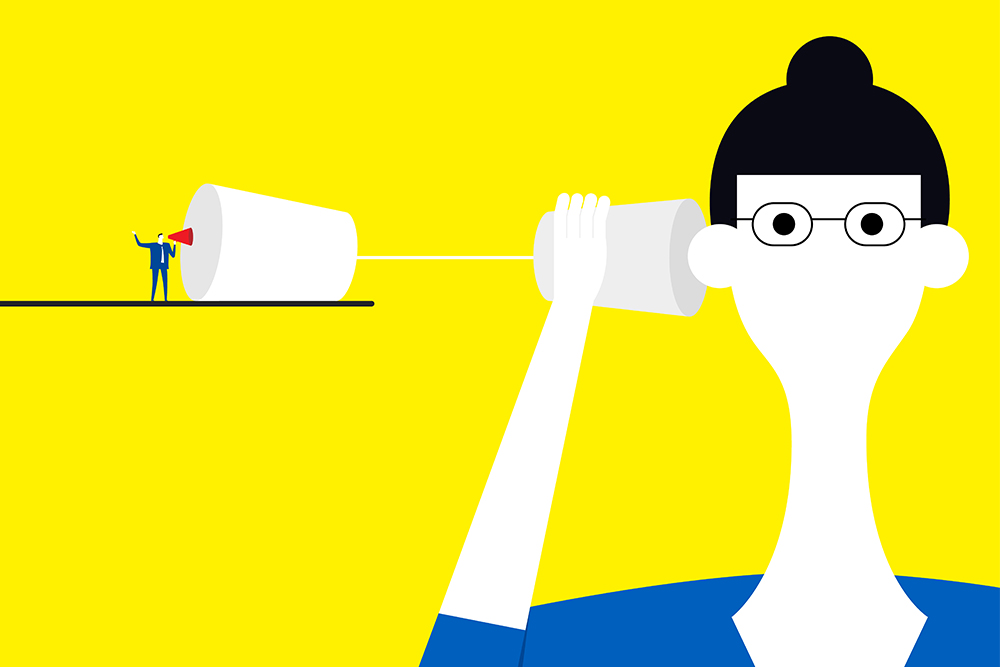Make a big impression with your small talk

Recently, a friend of mine was queuing for the water cooler at work when he politely let a female colleague fill up her flask first. ‘Go ahead, I’ve got a big one,’ he muttered absent-mindedly, motioning towards his water bottle. The woman burst out laughing and he was stunned into a silence on realising his faux pas. Water cooler small talk fail.
With freelance, hot desking and solitary work on the up, it wouldn’t be surprising if our small talk was getting worse. Has solitude (and social media) meant we’ve lost the knack of good conversation? And is it possible to get it back?
Could the answers be found at The School of Life’s How to Have Better Conversations course? A workshop investigating the psychology and philosophy of ‘good’ conversation sounded interesting – the prospect of having more enjoyable, less stilted, conversations was undeniably appealing, but of having to speak to people to improve it? Not so much.
BUSINESS AND PLEASURE
Sat in a room with 20 or so others, it became apparent that we weren’t all there for the same reason. ‘I’m here for business,’ one smartly dressed man piped up. ‘When I ask colleagues about the football, I get more from them – they’re more likely to help me out,’ he said, with a shrug. Another wanted help with his love life. ‘When a date is talking, I’m not listening to them – I’m thinking of the next question to ask because I hate silences,’ he admitted.
It makes sense that a conversation workshop would involve talking to people, but it didn’t stop me sinking lower into my chair on hearing the words: ‘Turn to the person next to you.’
But what I learned from my neighbours was reassuring – it turns out that most of us struggle with small talk. One woman explained she found moving conversations ‘on’ – once they’d discussed ‘safe’ topics like the weather – difficult. Another worried she upset people without meaning to. ‘I find myself commenting on their hair, and them taking it the wrong way,’ she said, much to the class’s amusement.
But, ultimately, we were all there to learn how to do it. How can we turn a tedious tête-à-tête into an engaging exchange? After discussing just that, we practised ‘openers’. The theory is that if we can start a discussion in an interesting way, half the battle is won. Instead of asking someone what they do for a living, ask them about the last book they read, our teacher suggested. Or who would play them in a film. Inside, I squirmed. Would I react well to that sort of question from a stranger? I’m not sure.
OPENING GAMBIT: HOW TO HAVE BETTER CONVERSATIONS
Elizabeth Stokoe, professor of social interaction at Loughborough University, isn’t sure either. ‘Opening a conversation in that way feels odd – it seems too ‘trained’ and unnatural. When a conversation feels rehearsed, it does the opposite of building rapport – it suggests you care more about yourself than their answer. You’re better off really listening – the best conversationalists design the conversation for the recipient.’ Take cold-callers – they ask the right things (‘How’s your day? Are you well?’), but we spot them a mile off because it’s disingenuous.
According to Elizabeth, repetitive small talk, while dreary, does serve a purpose. ‘We all dread it, but it’s necessary. When at the doctor’s surgery, for example, you’ll have the initial “How are you? Dreadful weather…” opener, before talking about something more intimate. You’re asking the other person to take turns with you in building a conversation.’ Instead of enriching a chat, going in with an unexpected, left-field question can do exactly the opposite.
Did I master the art of small talk? I’ve definitely learned useful techniques to move discussions on and avoid confrontation. But, really, being able to enjoy ‘good conversation’ stems from shared interests and chemistry.
According to philosopher Theodore Zeldin, a satisfying conversation is ‘one in which you say what you have never said before’. In which case, I need to spend less time fretting about the mechanics of communication and more time doing interesting things to talk about… perhaps the workshop worked after all.
More information on The School of Life talks…
Read more: To gossip or not to gossip?
5 ways to improve your chat
1. Build, don’t block
Instead of focusing on what you want to say next, or trying to solve the other person’s problems straight away, listen. Sometimes people want to voice an opinion, not be given a solution – so let them.
2. Reveal something about yourself
If you want a conversation to develop, then showing vulnerability is key – ‘Actually, I find parties like this stressful’ or ‘I’ve had a difficult day because of…’ Be brave!
3. Avoid being a ‘first-mover’
Do you find conversations regularly become stilted, or that they don’t really go anywhere?
You could be a first-mover, says Elizabeth Stokoe, professor of social interaction at Loughborough University. Typically, first-movers make challenging statements that irritate people. Try swapping a blunt ‘What’s your relationship history, then?’ for something softer.
4. Embrace silence
Allowing a conversation to breathe is important – considered responses indicate how seriously you’re taking what the other person is saying. Pauses are powerful – much more effective than ‘filling’ the gaps with nervous fluff.
5. Don’t take it personally
If a conversation doesn’t go the way you’d expect, don’t let it put you off. If someone isn’t forthcoming don’t assume the problem lies with you.
Read more: Do you have to be a psycho at work to get ahead?











